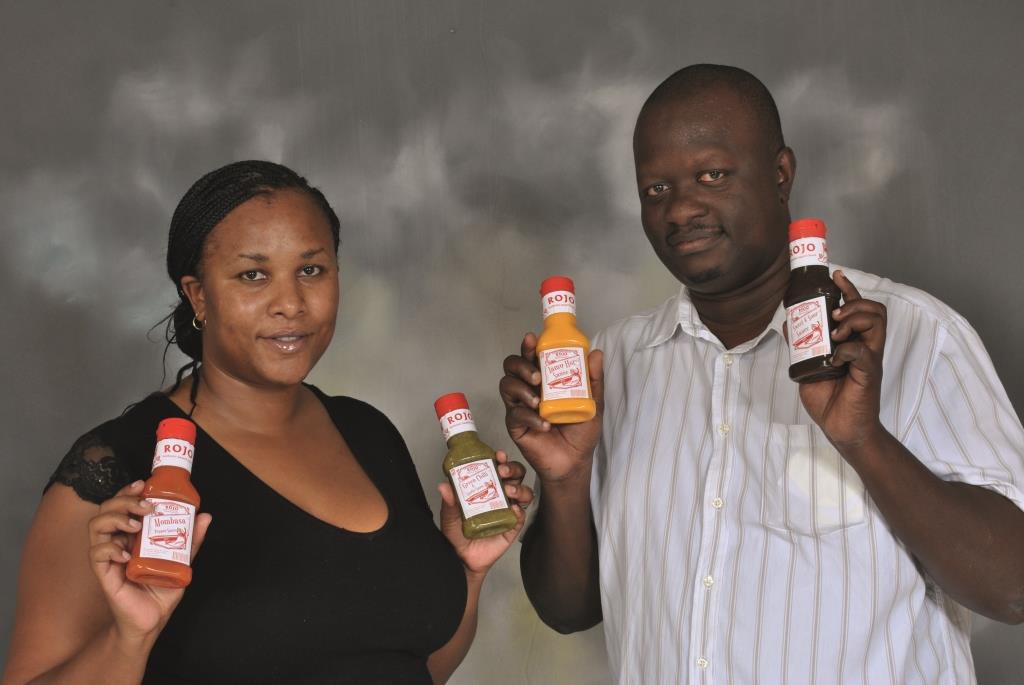Whenever Lynne Odhiambo and her husband, Harold, are out for dinner, one of her rituals includes holding a bottle of Heinz ketchup and caressing it passionately. For a moment she gets lost in thought, imagining what Henry John Heinz, the American founder of the H.J. Heinz food company must have felt knowing that his products were, and still are, a must-have item on many tables around the world. By the time the waiter interrupts her thoughts to take her menu, she knows that with each day that passes, she is a step closer towards becoming the Heinz of Africa and perhaps the world.
Lynne has a big dream, which started in her kitchen two years ago.
“We had been experimenting with different sauces that we [her and her husband] made in our kitchen and which we would often share with friends and family over meals. The sauces were always very well received and we were often asked why we were not selling them. The same friends and family became our first customers!” she explains.

That is how H&L Ventures (Harold and Lynne Ventures) was born.
The couple runs their business from their home located in the Kenyan coastal city of Mombasa—around 600 kilometers from the capital city, Nairobi. The husband and wife business is still at a humble start. They produce 100 bottles a week, each weighing 250ml, under the brand name Rojo.
“We started with a few hundred shillings to buy the ingredients and everything else was borrowed from the kitchen!” jokes Harold.
Why chilli? I ask.
“We love chilli on food, it is something we both grew up with, but as fast food has become more and more prevalent, we realized that the traditional condiment offerings that were common place in Mombasa, are no longer available. There was a time when if you went to a number of eateries in Mombasa, your food or snacks would come accompanied by a choice of a green chilli, red chilli, sweet and sour sauce and in most cases coconut chutney,” says Lynne.
The couple often wondered why the condiments were missing and realized it was because of the mix of cultures along Kenya’s coast. Mombasa was a major port in the European spice trade route.
“Our sauce draws on the coastal cuisine which is a mixture of Arab, Asian, European and African influences.”
H&L Ventures involves the production of the chilli sauces, their marketing and distribution. They have outsourced the cultivation of a variety of chilli peppers to a group of local farmers in Rabai, a historic area that is around 20 kilometers northwest of Mombasa.
Lynne uses a rare kind of chilli pepper, the Scotch Bonnet, which has a very unique bouquet—it is fragrant and very hot.
“Despite being one of the hottest chillies in the world, one only feels the heat after experiencing the taste. We chose Scotch Bonnet because we thought it had character and would add something distinctive and extra to our sauces,” says Lynne.
The couple admits that it is still too early in the game for them to feel like giving up. They are so passionate about Rojo that they have no time to worry.
“We have not felt like that but financial backing has been a major setback,” says Harold.
One of the major challenges has been the sourcing of the chilli peppers and the main reason why they decided to work with farmers in Rabai.
“It (Scotch Bonnet chilli) was only available in Uganda. Packaging was also another problem, we had wanted to package the sauce in glass bottles, and however, local manufacturers only supply bottles for liquor, so we had to settle for plastic bottles,” says Lynne.
Quality control issues are also a challenge as they are still operating from their kitchen at home.
“It has taken two years for us to settle on the right formulations, because we had to work with meagre funds.”
The business has a long way to go, like Heinz which started in 1869, Harold knows one day Rojo will compete with Heinz and may not take a century that it has taken the Heinz brand. Africa has a rapidly growing population and middle class. The rising concern about processed foods, which is leading to an increasing demand for organically grown food, is encouraging for their growing business.
“We envision that once we are operating at optimum capacity, the business will be realizing good margins. Our strategy is to remain an artisanal manufacturer, by getting into a niché in the market,” says Harold.
The food industry in Kenya and most of East Africa is largely dominated by international food brands and this is the segment the Rojo chilli brand is eyeing. In a years’ time, they would like to be the condiment brand of choice at every barbeque, table, in every household and restaurant. For now, the business has three employees including the couple who are part of the H&L Ventures. Lynne and Harold know that their business is growing and is hot—literally! 
